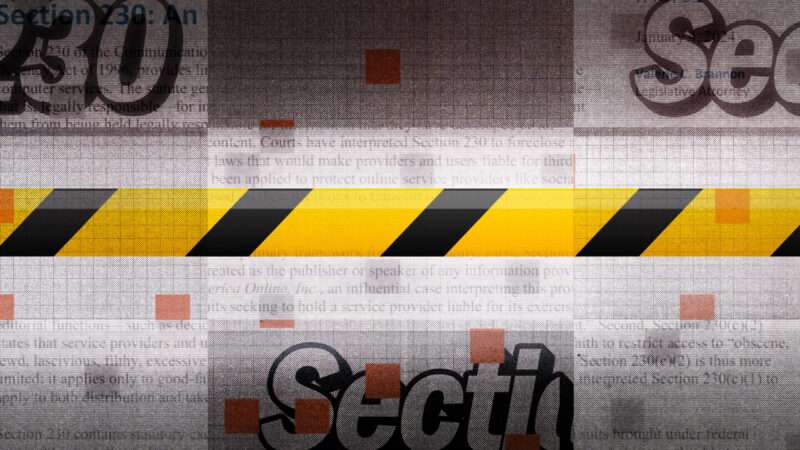The Worst Section 230 Bill Yet

In recent years, there’s been a steady stream of terrible proposals to amend Section 230, the part of federal communications law that’s made the internet as we know it possible. Without Section 230, websites would either be much more mired in toxic content or much more prone to suppressing all but the blandest speech. Yet weakening Section 230 has become a weird political hobby horse for both the left and the right, in part because so much misinformation surrounds it and in part because a lot of politicians loathe communications platforms (like social media and the internet more broadly) outside of their control.
Generally, such designs take the form of content-specific carve-outs (i.e., Section 230 doesn’t apply when such-and-such type of speech is concerned) or tech-specific conditions (i.e., large social media platforms must do X, Y, and Z or lose Section 230 protection).
But a new proposal does away with even that much nuance. It would simply “sunset” Section 230 after next year.
Bipartisan Lunacy
The draft proposal is bipartisan, which is how you know it’s especially bad. It comes from Rep. Cathy McMorris Rodgers (R–Wash.) and Rep. Frank Pallone (D–N.J.) and consists of exactly one provision:
Section 230 of the Communications Act of 1934 (477 U.S.C. 230) is amended by adding at the end the following:
“(g) SUNSET.—This section shall have no force or effect after December 31, 2025.”
While it’s nice to see legislation that doesn’t beat around the bush or wallow in legalese, the “Section 230 Sunset Act” is still really, really bad.
McMorris Rodgers and Pallone “seem to fundamentally misunderstand how the law works and what the consequences of repealing it would be,” writes Mike Masnick at Techdirt, pointing to the pair’s Wall Street Journal op-ed published Monday.
The McMorris Rodgers and Pallone op-ed manages to get just about everything about Section 230 wrong, including its origins. Section 230 was part of a panicky “protect the children” law known as the Communications Decency Act, not a measure meant to “help people and businesses connect, innovate and share information,” as the pair so absurdly claims.
(“There’s an old saying that goes, ‘How do you know when a politician is lying? His lips are moving.’ These days, one can ask, ‘How do you know when Section 230 is being misunderstood?’ and answer, ‘A politician is talking about it,’” Foundation for Individual Rights and Expression lawyer Robert Corn-Revere aptly wrote in Reason last year.)
McMorris Rodgers and Pallone go on to spew a litany of modern moral panics about tech companies. Big Tech is “refusing to strengthen their platforms’ protections against predators, drug dealers, sex traffickers, extortioners and cyberbullies,” they write, accusing Section 230 of making this possible.
But every big tech company has massive teams and tools devoted to stopping criminal and otherwise objectionable content on their platforms. Failing to do so can result in not only reputational harm and loss of advertising revenue but also potential criminal liability, as in the case of Backpage. Every incentive aligns for them to work hard to block “predators, drug dealers, sex traffickers,” etc. The fact that they can’t entirely end bad actors from using their platforms isn’t proof of Section 230′s flaws but the fact that we live in reality. In the digital world as much as off of it, some bad actors will find a way to do harm, no matter folks’ best intentions.
Besides, algorithms—which McMorris Rodgers and Pallone decry as tools of tech terror—explicitly prevent a lot of objectionable content from floating to the tops of everyone’s feeds. And algorithms are possible because of Section 230, as Masnick points out. “Without it, companies wouldn’t offer up any algorithms at all. This is because that would be moderating, and that would lead to the potential of knowledge, and with it, ruinous liability.”
A World Without Section 230
Section 230 is a short provision that provides website operators and users with some protection from legal liability for speech generated by other people.
Because Section 230 incentivizes both content moderation and free speech, a world without Section 230 would be a world in which some corners of the internet became more likely to shut down user-generated speech entirely and others became less likely to moderate at all. We’d see fewer venues for free speech online, along with a proliferation of spam, hateful speech, and other things that major tech companies usually work hard to keep away.
And an internet without Section 230 would not only be miserable for your average person online, it would also give even more power to big tech companies. Many smaller companies wouldn’t be able to keep up with the demands of running an interactive website in a world where Section 230 didn’t exist.
“I feel like it would be funny to finally let these idiots catch the car & take credit for crashing the internet & costing the US economy billions of dollars a week,” commented WIRED writer Dell Cameron on BlueSky. “I think the only reason they play this game at all is that they know they’ll never win.”
A shortcut to First Amendment protections
Section 230 enables free speech, so it’s no wonder that politicians dislike it. But your average internet user should be grateful for Section 230. So why are so many folks these days critical of it? In large part, it seems, because of misconceptions about the law.
One of the biggest misconceptions about Section 230 is that it gives social media or big tech platforms “special” protections above and beyond what would otherwise be allowed by law.
What a lot of people don’t understand is that in most cases where these platforms invoke Section 230 as a defense, the First Amendment would also be a defense. If the case went through a whole trial on the merits, the platform would ultimately prevail on First Amendment grounds.
But going through a whole trial every time an attorney general decides it would be fun to try and wring some money out of a big company, or every time a random person decided to try and score some civil lawsuit cash by objecting to something they see online, would be a huge suck on time, money, and resources for web companies. It would be prohibitively so for many smaller entities, forcing them to either severely suppress speech or go out of business. And it would be enough of a drain on bigger platforms that they would likely radically change content moderation policies, too.
Section 230 isn’t a special right granted to online entities, it’s a shortcut, allowing them to fend off doomed lawsuits without substantially less effort than mounting a full First Amendment defense would.
We made this video about Section 230 myths back in 2020, and (alas!) it’s still very much relevant today. Can someone please share with McMorris Rodgers and Pallone?
More Sex & Tech News
• Sentencing for Backpage co-founder Michael Lacey and former Backpage executives Jed Brunst and Scott Spear has been scheduled for July 9.
• A portal that “provides a direct real-time link from Dublin’s North Earl Street to people walking past on New York’s Fifth Avenue” was temporarily shut down on both ends because people flashed their breasts or pornographic images to onlookers across the sea.
• Twitter co-founder Jack Dorsey talked to Mike Solana of Pirate Wires about his decision to leave the board of BlueSky and delete his account. BlueSky “was supposed to be an open source protocol that Twitter could eventually utilize” and “was designed to be controlled by the people,” Dorsey said. “But little by little, [BlueSky users] started asking [BlueSky CEO] Jay [Graber] and the team for moderation tools, and to kick people off. And unfortunately they followed through with it,” he said. Dorsey accused BlueSky of “repeating all the mistakes [Twitter] made as a company. This is not a protocol that’s truly decentralized. It’s another app. It’s another app that’s just kind of following in Twitter’s footsteps, but for a different part of the population.”
• Techdirt Editor-in-Chief Mike Masnick shares his thoughts on Dorsey’s departure and his Pirate Wires interview. Masnick thinks BlueSky is still staying true to the original vision but “in order to get regular people to use it, Bluesky needs to have a user experience that feels like a centralized provider,” he writes.
don’t depend on corporations to grant you rights.
defend them yourself using freedom technology.(you’re on one)
— jack (@jack) May 4, 2024
Today’s Image

The post The Worst Section 230 Bill Yet appeared first on Reason.com.
Source: https://reason.com/2024/05/15/the-worst-section-230-bill-yet/
Anyone can join.
Anyone can contribute.
Anyone can become informed about their world.
"United We Stand" Click Here To Create Your Personal Citizen Journalist Account Today, Be Sure To Invite Your Friends.
Lion’s Mane Mushroom
Mushrooms are having a moment. One fabulous fungus in particular, lion’s mane, may help improve memory, depression and anxiety symptoms. They are also an excellent source of nutrients that show promise as a therapy for dementia, and other neurodegenerative diseases. If you’re living with anxiety or depression, you may be curious about all the therapy options out there — including the natural ones.Our Lion’s Mane WHOLE MIND Nootropic Blend has been formulated to utilize the potency of Lion’s mane but also include the benefits of four other Highly Beneficial Mushrooms. Synergistically, they work together to Build your health through improving cognitive function and immunity regardless of your age. Our Nootropic not only improves your Cognitive Function and Activates your Immune System, But it benefits growth of Essential Gut Flora, further enhancing your Vitality.
Our Formula includes:
Lion’s Mane Mushrooms which Increase Brain Power through nerve growth, lessen anxiety, reduce depression, and improve concentration. Its an excellent adaptogen, promotes sleep and improves immunity.
Shiitake Mushrooms which Fight cancer cells and infectious disease, boost the immune system, promotes brain function, and serves as a source of B vitamins.
Maitake Mushrooms which regulate blood sugar levels of diabetics, reduce hypertension and boosts the immune system.
Reishi Mushrooms which Fight inflammation, liver disease, fatigue, tumor growth and cancer. They Improve skin disorders and soothes digestive problems, stomach ulcers and leaky gut syndrome.
Chaga Mushrooms which have anti-aging effects, boost immune function, improve stamina and athletic performance, even act as a natural aphrodisiac, fighting diabetes and improving liver function.
Try Our Lion’s Mane WHOLE MIND Nootropic Blend 60 Capsules. Today Be 100% Satisfied Or Receive A Full Money Back Guarantee Order Yours Today By Following This Link.






